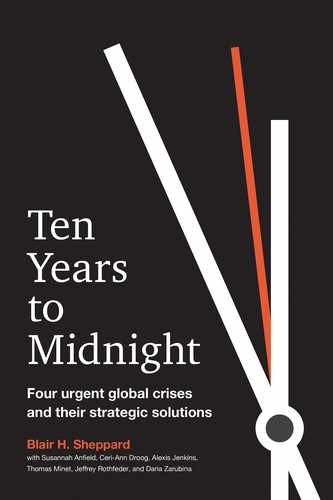0%
29Chapters
0-1Hours read
0kTotal Words
Book Description
“Shows how humans have brought us to the brink and how humanity can find solutions. I urge people to read with humility and the daring to act.”—Harpal Singh, former Chair, Save the Children, India, and former Vice Chair, Save the Children International
In conversations with people all over the world, from government officials and business leaders to taxi drivers and schoolteachers, Blair Sheppard, global leader for strategy and leadership at PricewaterhouseCoopers, discovered they all had surprisingly similar concerns. In this prescient and pragmatic book, he and his team sum up these concerns in what they call the ADAPT framework: Asymmetry of wealth; Disruption wrought by the unexpected and often problematic consequences of technology; Age disparities—stresses caused by very young or very old populations in developed and emerging countries; Populism as a symptom of the breakdown in global and national consensus; and loss of Trust in the institutions that underpin and stabilize society. These concerns are in turn precipitating four crises: a crisis of prosperity, a crisis of technology, a crisis of institutional legitimacy, and a crisis of leadership.
Sheppard and his team analyze the complex roots of these crises—but they also offer solutions, albeit often seemingly counterintuitive ones. For example, in an era of globalization, we need to place a much greater emphasis on developing self-sustaining local economies. And as technology permeates our lives, we need computer scientists and engineers conversant with sociology and psychology and poets who can code. The authors argue persuasively that we have only a decade to make headway on these problems. But if we tackle them now, thoughtfully, imaginatively, creatively, and energetically, in ten years we could be looking at a dawn instead of darkness.
Table of Contents
- Cover
- Title Page
- Copyright Page
- Dedication
- Contents
- Preface
- Part I How we Got to the Precipice
- Part II Conquering the Crises
- 7 Strategy: Rethinking Economic Growth—Local First
- 8 Strategy: Reimagining Success—Thriving in a Broken World
- 9 Structure: Repairing Failing Institutions—Cementing the Foundations
- 10 Culture: Refreshing Technology—Innovation as a Social Good
- 11 Massive and Fast: Problems That Cannot Wait
- 12 Leadership: Reframing Influence—Balancing Paradoxes
- A Note on COVID-19
- Epilogue
- Notes
- Acknowledgments
- Index
- About the Authors
